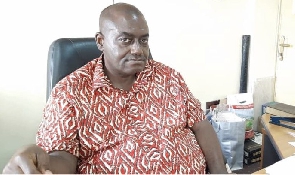Twelve public sector unions, which have come together to form the Forum for Public Sector Registered Pension Schemes, have given government a two-week ultimatum to address their concerns on low pension amounts paid by the Social Security and National Insurance Trust (SSNIT), or they will lay down their tools.
According to the Forum, they have been inundated with complaints from pensioners on the meagre amounts paid them when they proceed on retirement; hence their push for the increment.
At a press briefing, Chairman of the Forum and Executive Secretary of the Civil and Local Government Staff Association, Ghana, (CLOGSAG), Isaac Bampoe-Addo said:
“Within two weeks, if a proper and acceptable basis for payment of past credits is not arrived at, the Forum will have no option other than asking its members to embark on industrial action. We are overwhelmed with incessant calls and contacts from current retirees who have been paid exceptionally low past credits by SSNIT on its own terms, instead of complying with the dictates of the National Pensions Act, 2008 (Act 766 as amended) and directives from the National Pensions Regulatory Authority (NPRA).”
According to him, the relatively low pension earnings under the SSNIT Pension Scheme made the public sector Teachers and Civil Servants request to be placed on CAP 30. Beneficiaries under Cap 30 were receiving better retirement lump-sums and pension earnings. The CAP 30 pension scheme is a non-contributory pension scheme instituted in 1950 under the Pensions Ordinance, No. 42 of Chapter 30 for civil servants in the service before 1972.
“The intensity and sustenance of industrial actions during the early part of 2000 led the then Kufour government to establish the Presidential Commission on Pensions (PCP). Primarily, the PCP was tasked to critically examine the two pension schemes – that is the CAP 30 and SSNIT schemes as well as other schemes – and recommend a sustainable pension scheme that would address the concerns of workers,” he said.
Under section 824 of the Presidential Commission on Pensions, it was envisaged that under the tier-two scheme, it would pay improved pension benefits – especially the lump-sum, which the Commission (PCP) estimates will on average be 60 percent more than what CAP 30 presently pays, and about five times what SSNIT would have paid. It is also cost-neutral; which means, in effect, that there will be no significant cost burden on contributors – i.e., both employer and employee.
Consequently, workers within the public sector were assured of better pension earnings structured in a three-tier pension scheme upon the coming into effect of the National Pensions Act, 2008 (Act 766 as amended).
“Regrettably, SSNIT has not transferred the past credits in its custody to the respective approved trusts which are enjoined, by law, to manage the tier-two funds,” Mr. Bampo Addo said.
On her part, the president of the Ghana Registered Nurses and Midwives Association (GRNMA), Perpetual Ofori-Ampofo said: “We have been at this for the past four years. We have used all diplomatic avenues there are to have these issues addressed, and there seems to be no headway. When you talk about the NPRA and other stakeholders, I can tell you that they are helpless at this time. It is up to us now that our retirees are no more shortchanged. We are working now, but at a point we will go on retirement; and if we don’t correct this at this time, we will all be affected. So, this is the time.
“You cannot make contributions to a pensions institution for 20-30 years, contributions to a second tier just for 10-years, and the 30-years (SSNIT) gives you 4 or 5 thousand while the 10-years (second tier) is able to give you 14-15 thousand; this makes no sense. We are saying the computation that SSNIT is using is not right,” she said.
But SSNIT has always maintained that the amount one receives as Past Credit solely depends on the salaries on which contributions were paid prior to January 2010 and Treasury bill interest rates.
Again, effective January 2020, second-tier scheme operators took over the payment of lump-sums to pensioners in accordance with the National Pensions Act, Act 766. SSNIT therefore no longer pays the 25% lump-sum benefit to contributors who retire effective January, 2020. Pensioners are therefore entitled to a lump-sum from the second-tier scheme.
It adds that SSNIT only pays monthly pension and Past Credit to pensioners who qualify, and management remains firmly committed to paying over GH¢ 213 million in monthly pensions to the 213,173 pensioners on the SSNIT payroll; as well as honouring payments to all new pensioners that apply.
Click to view details



Business News of Thursday, 11 June 2020
Source: thebftonline.com

















